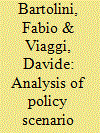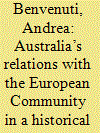| Srl | Item |
| 1 |
ID:
116962


|
|
|
|
|
| Publication |
2012.
|
| Summary/Abstract |
The agriculture sector's contribution to energy production is a central issue in ongoing policy debates, and one of the central elements of the development of Bioeconomy sector. The Common Agricultural Policy (CAP) is one of the main determinants of the different farm strategies of European farmers. The CAP is now undergoing a thorough revision process which necessarily includes a debate of the role of the policy in rural areas and the effectiveness of the various CAP policy mechanisms. The objective of this paper is to assess the impact of alternative CAP scenarios in the light of the possible changes in 2013 and the willingness to adopt energy plants for energy crops in the Province of Bologna (Italy). This is pursued using both survey information and farm-household mathematical programming models, hence using stated intentions and simulated profitability to analyse the adopt of new technologies for energy production. The results underscore the relevance of the CAP scenarios in altering intentions with regard to the adoption of energy production and the relevant effect of uncertainty in delaying the diffusion of energy production systems.
|
|
|
|
|
|
|
|
|
|
|
|
|
|
|
|
| 2 |
ID:
159682


|
|
|
|
|
| Summary/Abstract |
In 2015, Australia and the European Union successfully negotiated a Framework Agreement. This agreement is an essential step in establishing a stronger Australia–European Union partnership and achieving closer bilateral cooperation. For years, negotiating such an agreement had proved impossible. In the 1970s, successive Australian governments showed interest in enhanced collaboration with the European Community, but the political climate for closer relations was far from encouraging. This article explains why this was the case. In doing so, it also explores how the Whitlam and Fraser governments envisaged, framed and developed Australia’s ties with the European Community in the 1970s, and asks whether a more positive approach on their part could have led to a stronger relationship. Based on recently declassified government files, this article shows that although both Whitlam and Fraser fully grasped the importance of the European Community as an emerging international actor and were willing to deepen Australia’s ties with it, significant constraints existed against enhanced bilateral cooperation. With the Common Agricultural Policy still a considerable challenge to Australian economic interests and with the European Community focused mainly on the management of its internal market, broader political considerations were inevitably relegated to the margins of Australia–European Community consultations.
|
|
|
|
|
|
|
|
|
|
|
|
|
|
|
|